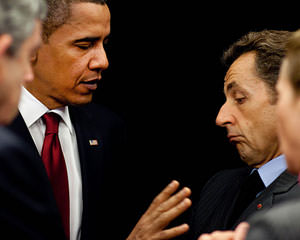Inconsistent Principles
There’s a problem when world leaders announce fervid support for universal principles: There is no way to avoid having those highflying words flung back at them at another time, during some other crisis, when they will have no choice but to lie or duck and scamper for cover. (more)
There’s a problem when world leaders announce fervid support for universal principles: There is no way to avoid having those highflying words flung back at them at another time, during some other crisis, when they will have no choice but to lie or duck and scamper for cover.
Case in point: President Nicolas Sarkozy’s declaration at the Elysees Palace in Paris after France, the U.S. and several European and Arab states met to work out the mechanics of the no-fly zone over Libya.
France and its partners are acting, Sarkozy explained, to support the legitimate democratic aspirations of the Libyan people — unarmed civilians who have risen up to overthrow a detested dictatorship. There is no way the international community could stand by and watch innocent civilians be slaughtered. This was the same justification cited by President Barack Obama the day before after the U.N. Security Council vote.
Sarkozy took no questions after his statement. Nor did Obama — for good reason.
Questions such as “Mr. President, how do you justify intervening in Libya to prevent the bloody repression of a popular uprising when we watch as your good allies, the Saudis, move their forces into Bahrain to quash a popular uprising in that country (where U.S. warships are permanently based)?”
Or, “Mr. President, do you have anything concrete to say about plans for U.N. intervention in Yemen, where more than 50 demonstrators were shot down in cold blood by snipers dressed as civilians apparently carrying military ID?”
Or, “President Sarkozy, does your declaration mean that France is now going to move militarily in your former colony, the Cote D’Ivoire, where your foreign minister has just condemned ‘a deliberate massacre of civilians’ by the forces of President Laurent Gbagbo after another bombardment killed almost 30 in Abidjan? Gbagbo’s refusal to cede power after losing an election has resulted in the deaths of thousands. So, Mr. President?”
And, while we’re at it, “Mr. President, what should the U.N. or your allies do if the people of Zimbabwe rise up? Or the folks in Shanghai?”
Our leaders’ dilemma is made much worse by technology.
There was a time, before the Internet and mobile phones, before satellites and 24/7 television, when events took time — sometimes weeks or months — to unfold, when negotiations — say, between rebels in America and the British crown — transpired with the stately speed of a sailing ship, when word of massacres and revolts could be written off as rumor, repressed for months or buried forever.
No longer.
Now events move at the speed of the Internet. Once-isolated villages in Tunisia and Yemen and on the northeastern coast of Japan are all part of the global village. Billions across the planet can both report and witness. Ambassadors become figures of ceremony, looking on with the rest of us as world leaders, who once had days or weeks to ponder their communications, now address each other directly, responding almost instantly — blustering, menacing — with no time for thought or reflection, bouncing off each other like billiard balls.
The result also is that the duplicity that underlies what we call “affairs of state” — the hypocrisy and cynicism that used to be veiled by vague declarations, by time and distance — that deception becomes ever more blatant.
Like an Orwellian exchange recently on Al-Jazeera English in which a representative of the Iranian government excoriated a Saudi official for the Saudi army’s repression of the popular democratic uprising in Bahrain. The Iranian did it with a straight face, mind you.
On the other hand, the leaders of the United Arab Emirates have managed a bow to all sides: They are participating in both the Saudi-led repression of the uprising in Bahrain and the French/U.S.-led attempt to rescue the uprising in Libya.
I imagine that the UAE leaders, being accomplished statesmen, somehow manage that moral straddle with a straight face, as well.
Barry M. Lando spent 25 years as an award-winning investigative producer with “60 Minutes.” He has produced numerous articles, a documentary and a book, “Web of Deceit,” about Iraq. Lando is finishing a novel, “The Watchman’s File.”
Your support matters…Independent journalism is under threat and overshadowed by heavily funded mainstream media.
You can help level the playing field. Become a member.
Your tax-deductible contribution keeps us digging beneath the headlines to give you thought-provoking, investigative reporting and analysis that unearths what's really happening- without compromise.
Give today to support our courageous, independent journalists.






You need to be a supporter to comment.
There are currently no responses to this article.
Be the first to respond.